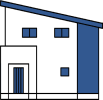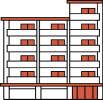Finding a Home

Izanau is designed to help you find a home in Japan.
You can either search on our site or contact us
and we can support you in the process of finding a home in Japan.
You can either search on our site or contact us
and we can support you in the process of finding a home in Japan.

We recommend that you begin your search 1.5 ~ 2 months before your desired move in date.
This give you enough time to understand what is available in the area you wish to move to. In addition, you should calculate about two weeks for the application ~ contract process.
This give you enough time to understand what is available in the area you wish to move to. In addition, you should calculate about two weeks for the application ~ contract process.

Find an apartment
↓
Submit application
↓
Tenant Screening
↓
Initial Payment
↓
Sign Contract
↓
Move In
↓
Submit application
↓
Tenant Screening
↓
Initial Payment
↓
Sign Contract
↓
Move In

A. 2 forms of identification
Passport (and visa), residence card, driver's license, student ID etc.
B. Proof of Employment/ Student Status
Employment letter, certificate of eligibility, invitation letter, or any other documents proving your activities in Japan.
C. Guarantor
Your guarantor can be:
Your employer
A Japanese citizen
A financially stable foreigner
A guarantor company
D. Proof of Income/Bank Statement
Recent payslip in Japan.
E. Japanese Phone Number
F. Japanese Bank Account
G. Emergency Contact in Japan
Passport (and visa), residence card, driver's license, student ID etc.
B. Proof of Employment/ Student Status
Employment letter, certificate of eligibility, invitation letter, or any other documents proving your activities in Japan.
C. Guarantor
Your guarantor can be:
Your employer
A Japanese citizen
A financially stable foreigner
A guarantor company
D. Proof of Income/Bank Statement
Recent payslip in Japan.
E. Japanese Phone Number
F. Japanese Bank Account
G. Emergency Contact in Japan

Basic costs include:
Security Deposit (敷金 - shikikin)
Key Money (礼金 - reikin)
First Month’s Rent(前家賃 - maeyachin)
Agent Fee(仲介手数料 - chūkai tesuryo)
Fire Insurance(火災保険 - kasai hoken)
Lock Replacement Fee(鍵の交換費用 - kagi kõkan hiyō)
Management Fee(管理費 - kanrihi)
Security Deposit (敷金 - shikikin)
Key Money (礼金 - reikin)
First Month’s Rent(前家賃 - maeyachin)
Agent Fee(仲介手数料 - chūkai tesuryo)
Fire Insurance(火災保険 - kasai hoken)
Lock Replacement Fee(鍵の交換費用 - kagi kõkan hiyō)
Management Fee(管理費 - kanrihi)
Moving In

Unless specified, apartments in Japan do not come with appliances. Check the specifications of the apartment carefully before submitting an application. In most situations you will need to purchase your own air conditioner, refrigerator, washing machine, and sometimes even a stove for older apartments.

Utilities will be shut off before you enter your apartment. Your landlord or management office will have information about which company(s) to contact to turn on your utilities.

Most buildings have only one internet provider, so if you want fiber optic internet for your home you will need to use the provider that is authorized for your building. If you are moving into a house that doesnt have internet installed there are three main companies that provide fiber optic interent, auひかり (au Hikari), フレッツ光 (Flet's Hikari - NTT) Nuro by So-net (Sony).
The other option is to get wireless internet service from companies like UQ WiMAX, or SoftBank Air.
The other option is to get wireless internet service from companies like UQ WiMAX, or SoftBank Air.
Living

For a standard apartment in Japan monthly fees include: rent, maintenance fees, utilities (water, gas, electricity), internet.
For more information on cost of living in Japan please click here.
For more information on cost of living in Japan please click here.

This depends on your apartment and on your contract. Always check the terms of your contract when signing and if you would like to live with another person in your current apartment always inform your landlord or management company so that they can give their approval and amend your contract.

If you want to keep a pet search for apartments that allow pets. The terms of keeping pets are clearly stated on all property listings and in your rental contract. In addition, even pet friendly apartments may have restriction on the kind or number of pets allowed in the apartment so always double check the conditions with your landlord or management company.

This depends on if you are in a big city or in a more rural area.
In big cities, and big apartment buildings, it has become common for people to stay anonymous even while living next door to each other. Aside from general greetings in common areas like konnichiwa or ohayōgozaimasu, there is no obligation to interact with your neighbors. If you are moving in, moving out or getting some repairs in the apartment that could be disruptive to the neighbors it is common for the contractor to inform the neighbors in advance.
In a rural area, interaction with neighbors might be unavoidable. Check out this article for insights on neighborliness in Japan.
In big cities, and big apartment buildings, it has become common for people to stay anonymous even while living next door to each other. Aside from general greetings in common areas like konnichiwa or ohayōgozaimasu, there is no obligation to interact with your neighbors. If you are moving in, moving out or getting some repairs in the apartment that could be disruptive to the neighbors it is common for the contractor to inform the neighbors in advance.
In a rural area, interaction with neighbors might be unavoidable. Check out this article for insights on neighborliness in Japan.

Always call your management company or landlord first. They generally have standard contractors who are familiar with the building who can assist you.

The most standard way that most municipalities separate trash is into these 4 categories: burnable, bottles & cans, plastics, non-burnable. Each category of trash is picked up on different days of the week so make sure you check the trash calendar in your building or in your neighborhood. Some places might have independant collection services for paper so make sure you confirm all these details after you move in.
Also make sure you buy the correct trash bags for each kind of trash or your trash will get left behind!
Also make sure you buy the correct trash bags for each kind of trash or your trash will get left behind!

Koshin ryo (更新料) is sometimes (often depending on the region) included in lease contracts. Check if your lease contract includes a renewal fee at the time of signing. Renewal fees are not required by law, but once you sign a contract that includes a renewal fee you will be legally obligated to pay the fee when you renew your lease.
Moving Out

"This depends on your rental contract. Some properties require a 2-3 month notice when moving out, but one month notice is the most common. For larger complexes like UR properites they require notice by a certain date (e.g. the 10th of the month) if you will move out at the end of that month.
In addition, rental contracts tend to be rolling contracts, so even if your initial contract term was just one year the contract will continue until one party terminates the contract."
In addition, rental contracts tend to be rolling contracts, so even if your initial contract term was just one year the contract will continue until one party terminates the contract."

The standard costs are cleaning and covering any major damage in the apartment that occured during your stay. If you paid a deposit when you moved it, these costs will be deducted from the deposit. In some cases the landlord may also charge to get the locks changed.

メルカリ(Mercari) is the best place to sell your things to people nationwide. If you prefer to sell locally there are region specific sayonara sale facebook groups that you can join to sell you things.
Buying a Home

Yes. Foreigners have the same rights as Japanese citizens or residents in regards to purchasing property or land in Japan. You do not need a permanent residence or a long term visa in order to purchase property.

Foreigners can get loans to buy property in Japan but only if they are a permanent resident or their spouse is a Japanese citizen or permanent resident.

From Inside Japan
Certificate of Residence*
Residence Card*
Seal/Registered Seal Certificate ○
2 forms of Identification
From Outside Japan
Affidavit (instead of *)
Signature (instead of ○)
Certificate of Residence*
Residence Card*
Seal/Registered Seal Certificate ○
2 forms of Identification
From Outside Japan
Affidavit (instead of *)
Signature (instead of ○)
Floor Plan Guide


1. バルコニー : Balcony
2. 洋室 (yōshitsu) : Western style room where there floors are generally wood, vinyl, carpet, or tile
3. 和室 (washitsu) : Japanese style room with tatami floors
4. DK : Dining Kitchen, living space between 6.12m2~ 12.96m2
5. LDK : Living Dining Kitchen, living space larger than 12.96m2
6. CL : Modern closet space designed for storing clothes and shoes
7. 押入 (oshi-ire) : Japanese style closet (75 cm deep & sliding doors). For storing futons (Japanese bedding)
8. 浴室 (yokushitsu) : Bathing room, usually includes both shower and bath tub
9. 洗面室 (senmen shitsu) : Room with wash basin & vanity
10. トイレ : Toilet
11. 収納 (shūnō) : Storage space
12. 玄関 (genkan) : Entrance
13. 下駄箱 (getabako) : Shoe closet
2. 洋室 (yōshitsu) : Western style room where there floors are generally wood, vinyl, carpet, or tile
3. 和室 (washitsu) : Japanese style room with tatami floors
4. DK : Dining Kitchen, living space between 6.12m2~ 12.96m2
5. LDK : Living Dining Kitchen, living space larger than 12.96m2
6. CL : Modern closet space designed for storing clothes and shoes
7. 押入 (oshi-ire) : Japanese style closet (75 cm deep & sliding doors). For storing futons (Japanese bedding)
8. 浴室 (yokushitsu) : Bathing room, usually includes both shower and bath tub
9. 洗面室 (senmen shitsu) : Room with wash basin & vanity
10. トイレ : Toilet
11. 収納 (shūnō) : Storage space
12. 玄関 (genkan) : Entrance
13. 下駄箱 (getabako) : Shoe closet
Glossary
マンション
Manshon
Mansion: Used interchangeably with apartment, but generally used for concrete buildings more than 3 stories high
アパート
Apāto
Apartment: used interchangeably with mansion, but generally used for wooden or lightweight steel structures under 3 stories high.
一戸建て
Ikko date
Detached House
テラスハウス
Terasu hausu
Terraced House: Individual apartments or houses that share common walls. For ownership purposes, the site is sectioned and owned individually.
タウンハウス
Taun hausu
Townhouse: Individual apartments or houses that share common walls. For ownership purposes, the site is owned communally.
シェアハウス
Shea hausu
Share House: a house or apartment that where tenants rent individual rooms but other facilities like bathroom, kitchen, living room are communal with other tenants.
R
R
Room
K
K
Kitchen
DK
DK
Dining Kitchen
LDK
LDK
Living Dining Kitchen
玄(玄関)
Gen /Genkan
Entrance
洋(洋室)
Yō/Yōshitsu
Western style room where there floors are generally wood, vinyl, carpet, or tile
和(和室)
Wa/Washitsu
Japanese style room with tatami floors
浴(浴室)
Yoku/Yokushitsu
Bathing room, usually includes both shower and bath tub
WC(トイレ)
Toire
Stands for "water closet" and is used to refer to the toilet room
UB(ユニットバス)
Yunitto basu
Unit bath: a bathroom where the bathing area, sink and toilet are all in one room.
トイレバス別
Toire basu betsu
When the bathing area (tub and shower), sink, and toilet are in separate spaces
洗面(洗面所)
Senmen/Senmenjyo
Wash basin & vanity
シャンプードレッサー
Shanpū doressā
Shampoo dresser: larger sized sink with extendable hose that can be used for washing hair
洗濯(洗濯機置き場)
Sentaku/Sentakuki okiba
Space for washing machine
押(押し入れ)
Oshi/Oshiire
Japanese style closet usually 75 cm deep with sliding doors. Designed to store futons (Japanese bedding).
収納
Shūnō
Storage space
CL (クローゼット)
Kurōzetto
Modern closet space designed for storing clothes and shoes.
PS (パイプスペース)
Paipu supēsu
Pipe space: the shaft where utility pipes are consolidated.
MB (メーターボックス)
Mētābokkusu
Meter box
システムキッチン
Shisutemu kicchin
A complete kitchen unit including sink, stove, and countertop, as opposed to a kitchen where the stove needs to be separately installed.
電気コンロ
Denki konro
Electric stove
IHヒーター
IH hītā
Induction stove
ガスコンロ
Gasu konro
Gas stove
カウンターキッチン
Kauntā kicchin
Counter kitchen: kitchen with counter space for eating usually facing the common area
湯沸器
Yuwakashiki
Water heater
追い焚き
Oidaki
Bath reheater
インターホン
Intāfon
Intercom
TV付モニターホン
TVtsuki monitāfon
Video Intercom
浴室乾燥機
Yokushitsu kansōki
Bathroom ventilation/dryer
温水洗浄便座
Onsui senjyō benza
Bidet with heating feature
オートロック
Ōtorokku
Auto-lock
オール電化システム
Ōrudennka shisutemu
Home system run entirely on electricity, including stove and water heater.
駐車場
Chūshajyō
Parking lot
床暖房
Yukadan
Floor heating
フローリング
Furōrinngu
Flooring: used in western style rooms. Can be wood, tile, vinyl, carpet, etc.
クッションフロアー
Kusshon Furoā
Cushioned flooring generally made from a vinyl chloride-based material
下駄箱
getabako
Shoe closet
木造
Moku-zō
Wood structure
軽量鉄骨
Keiryōtekkotsu
Light gauge steel
鉄骨造
Tekkōzō
Heavy steel frame
RC造/鉄筋コンクリート
RC zō/ Tekkin konkurīto
Reinforced concrete
SRC造/鉄骨鉄筋コンクリート
SRC zō/ Tekkotsu tekkin konkurīto
Reinforced steel frame concrete
PC造
PC zō
Precast concrete
ALC造
ALC zō
Autoclaved lightweight concrete
家賃
Yacchin
Rent
前家賃
Mae yacchin
First month's rent
共益費
Kyōekihi
Maintenance fee (for communal spaces)
損害保険料
Songai hokenryō
General property insurance that usually includes fire and earthquake insurance
敷金
Shikikin
Security deposit
礼金
Reikin
Key money
仲介手数料
Chūkai tesūryō
Agency fee
日割り家賃
Hiwari yacchin
Pro-rated rent
鍵の交換費用
Kagi kōkanhiyō
Lock changing fee
保証人
Hoshōnin
Guarantor
火災保険
Kasai hoken
Fire insurance: property insurance that generally covers damage due to fire, lightning, explosion, weather, water damage, and theft.
地震保険
Jishin hoken
Earthquake insurance: property insurance that covers damage due to earthquake, volcano, and tsunami.
契約期間
Keiyaku kikan
Term of contract
更新料
Kōshinryō
Lease renewal fee
解約
Kaiyaku
Termination of contract
Please Feel Free to Contact Us
CONTACT
CONTACT






